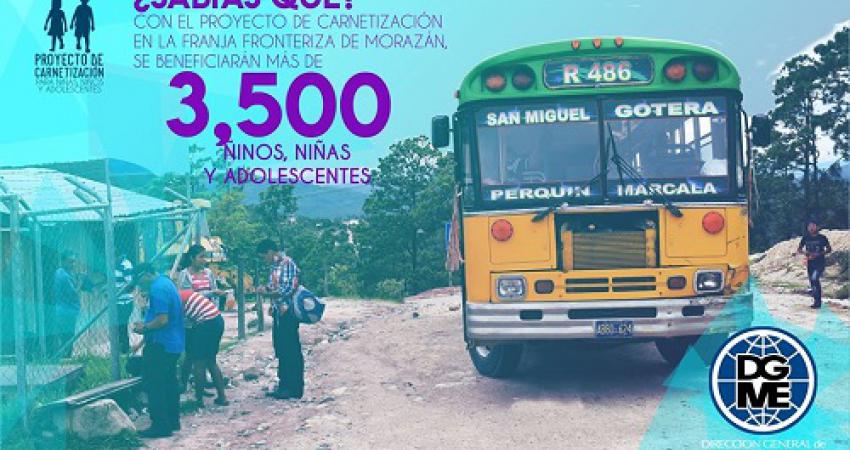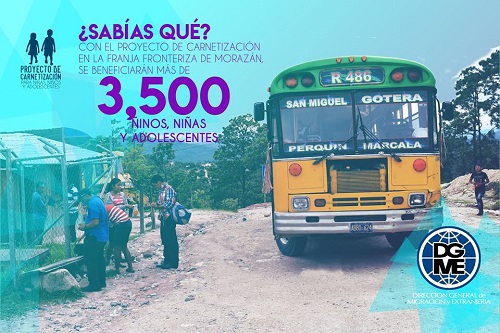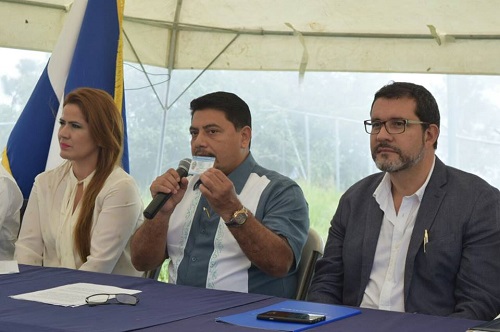El Salvador’s General Directorate of Migration and IOM deliver Transit Cards to minors in border zone with Honduras

On August 25, El Salvador´s General Directorate of Migration (DGME in Spanish), with the support of the International Organization for Migration (IOM), began issuing documentation for children and adolescents who reside along the border with Honduras, and who often cross the border strip in Morazán. The Border Transit Card aims to facilitate safe and orderly migration for residents in the border municipalities of Perquín, Arambala and Nahuaterique.
The DGME, committed to guaranteeing the safety of the people and to carrying out straightforward and safe migration controls, is delivering this document for children and adolescents who circulate daily through the border, thus guaranteeing better control of the arrivals and departures of these minors. A database will also be created to record and keep count of this vulnerable population and so contribute to a better protection of these children and adolescents against the crimes of smuggling and human trafficking.

The official event was led by Héctor Rodríguez, the Director General of Migration, Jorge Peraza Breedy, the IOM Chief of Mission for El Salvador, Guatemala and Honduras, and Nadine Perrault, UNICEF´s Representative in El Salvador, as well as local government representatives for Perquín, Arambala and Nahuaterique.
"With this project we will benefit more than 3,500 children and adolescents. We, as a country, had a debt to this population, but, through Migration, we are paying this debt off. We will issue documents to all the children in these three municipalities so their immigration procedures can become easier," said the Director General of Migration.
"We welcome this day, as we are not only contributing to the optimization of migration processes, but we are also helping to guarantee and restitute the right to identity. In addition, with this card we are contributing to the fulfillment of the right to education and to health of these children and adolescents who cross the border daily in order to access these services," said IOM's Chief of Mission.
As part of the implementation of this migration control procedure, an electronic kiosk will also be installed through which the migratory registration will be carried out. Children and adolescents will only have to slide their cards and the kiosk will generate a registration ticket of the process, which will then be verified by an immigration officer at the border.
The card is free and mandatory. In cases where children have passports, they can use either document.

The DGME is also considering a second phase in which persons in vulnerable conditions and other adults in the different border areas between El Salvador and Honduras and also Guatemala could be included so as to further promote integration in the northern part of Central America.
In 2015, the IOM developed a population and housing census in the border region of Nahuaterique that contributed to the registration of more than 6,000 people, thus facilitating better access to social programs with a special emphasis on health, education and housing. As stipulated in the 1998 Convention on Nationality and Rights Acquired in Delimited Zones, the governments of El Salvador and Honduras acknowledged the right of the population in this area to choose both Salvadoran and Honduran nationality and also granted the right of ownership and free of movement across the border.
This project, developed by the DGME, is being carried out within the framework of the Mesoamerica Program to strengthen the capacities for safe, orderly, and regular migration. The project is funded by the US Department of State and is implemented by the IOM. It also has the support of the municipalities of Arambala and Perquín, as well as the staff of the Monitoring Commission of the Ministry of Foreign Affairs.